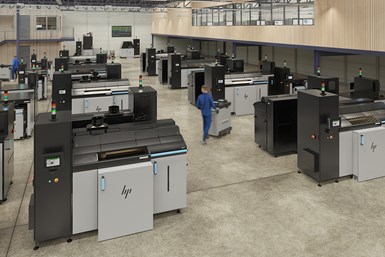HP, GKN Additive Partner to Qualify Diverse Range of Materials for Additive Manufacturing
The collaboration focus is to combine HP’s Metal Jet S100 technology with unique material offerings to take tooling to the next level while addressing unique customer challenges.
Share
Read Next
HP is collaborating with GKN Additive on the qualification of a diverse range of materials for HP’s Metal Jet S100 customers, including 10 different steel grades such as M2 tool steel and a dual-phase steel (free sintering low alloy).
A strategic area of focus for this collaboration is to advance GKN’s efforts to combine HP’s Metal Jet S100 technology with unique material offerings to take tooling to the next level with a precision-focused approach tailored to address unique customer challenges. The aim is to accelerate innovations in the tooling industry to achieve enhanced productivity and unrivaled quality without the need for traditional machining.
Examples of such innovations include:
- No Machining: Develop near-net shaped tools, significantly reducing material waste and production time.
- Wire/Sink Erosion: Final contour of tools is achieved through wire/sink erosion, ensuring precision and efficiency.
- Hot Isostatic Pressing (HIP): Enhance the density and integrity of 3D printed components, optimizing their performance.
- Plasma Nitriding: Surface treatment to improve wear resistance and durability.
- Physical Vapor Deposition (PVD) Coating: Provide tools with enhanced surface properties.
GKN Additive and HP’s collaboration will continue expanding material availability and advancements for the tooling industry by combining GKN’s material and production expertise with HP’s process knowledge to accelerate qualification work. Customers can purchase powders directly from GKN and access HP's Professional Services to establish a development program for their specific needs.
The collaboration between HP and GKN Additive demonstrates their shared vision of pushing the boundaries of what is possible in additive manufacturing. By bringing together advanced materials and innovative tooling solutions, they aim to unlock new realms of productivity and quality.
Related Content
-
BMW Expands Use of Additive Manufacturing to Foster Production Innovations
The BMW Group is manufacturing many work aids and tools for its own production system using various 3D printing processes, with items such as tailor-made orthoses for employees, teaching and production aids, and large, weight-optimized robot grippers, which are used for such things as carbon fiber-reinforced polymer roofs and entire floor assemblies.
-
In "Hybrid" FIM Process, 3D Printing Complements Injection Molding
In a recent case study, Alpine Advanced Materials partnered with Nexa3D to produce 3D printed tooling for injection molded composites. Utilizing Nexa3D’s XiP desktop 3D printer and its Freeform Injection Molding process, Alpine was able to reduce prototype tooling production time and cost alike for its customers.
-
Chuck Jaws Achieve 77% Weight Reduction Through 3D Printing
Alpha Precision Group (APG) has developed an innovative workholding design for faster spindle speeds through sinter-based additive manufacturing.















